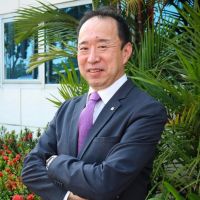
Shousuke Namiyama
Managing Director of Bridgestone Tire Manufacturing (Thailand)
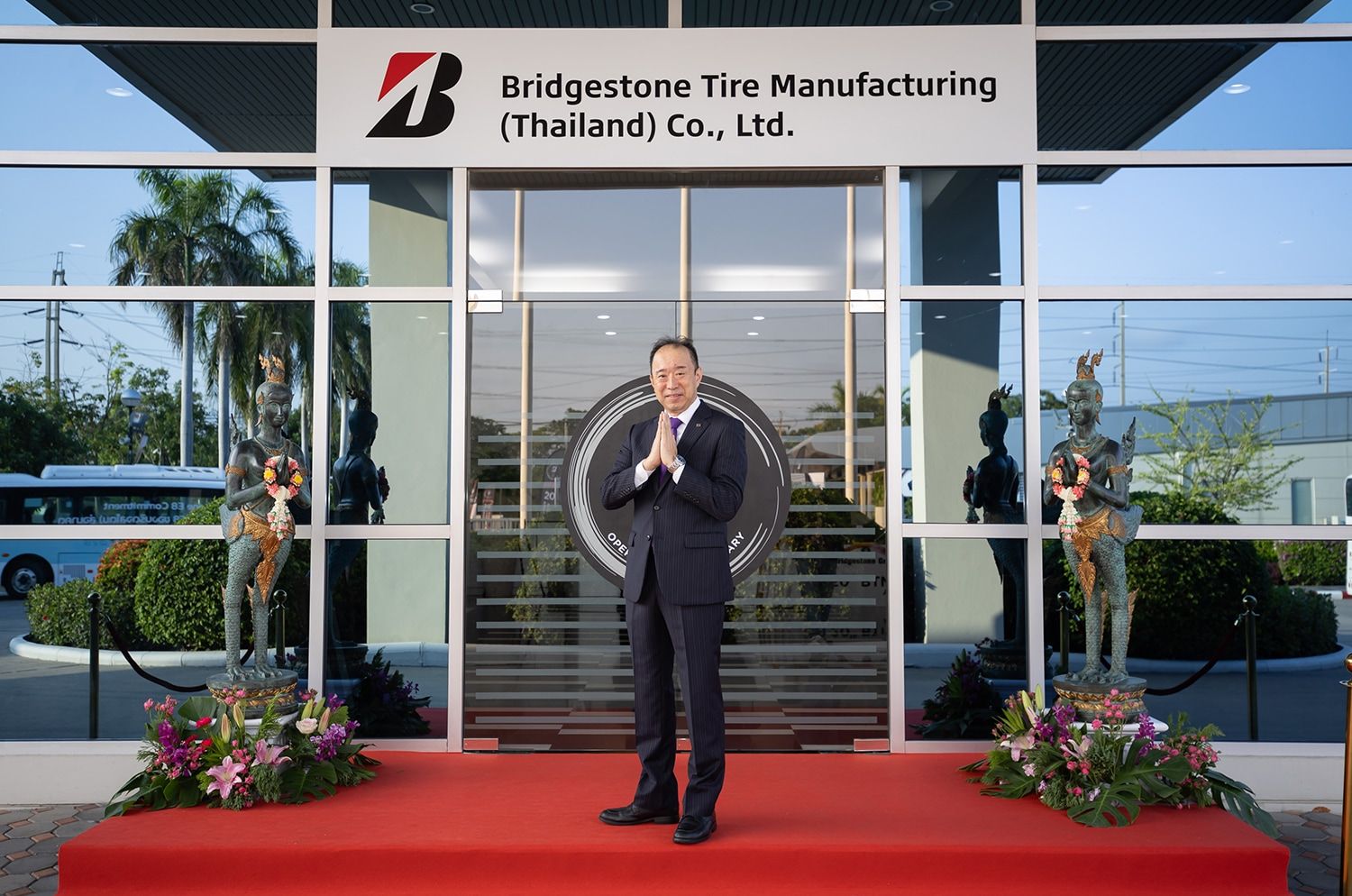
Photo: Mr. Shousuke Namiyama,
Managing Director of Bridgestone Tire Manufacturing (Thailand) Co., Ltd.

The more our business expands around the world, the more difficult it is to pass on Bridgestone's DNA to the entire company, at the same time, its importance is increasing,
To achieve the final goal, we decipher the company policy set by the founder.
Bridgestone Corporation was founded in 1931 in Kurume City, Fukuoka Prefecture, Japan. It achieved sales of 63 million USD (10 billion yen) in 1953 and became the leading tire company in Japan. In 1965, Bridgestone Malaysia started the operation as the first overseas factory, marking the beginning of global expansion. In 1988, the company accelerated its business expansion in Europe and the United States by acquiring the large American company, Firestone, for 2.6 billion USD (410 billion yen), continuing to grow as a leading global tire manufacturer.
The company will celebrate its 100th anniversary in 7 years. Regarding the significance of this milestone, Managing Director Namiyama explained, "The vision set by the current Global CEO is to become a sustainable solutions company by 2050. The 100th anniversary in 2031 is merely a passing point, yet it is a time to look back at what the company should be like in order to make that vision happen." He added, “It is time to interpret the current global mission of 'Serving Society with Superior Quality' which was set as the company policy by founder Shojiro Ishibashi at the time, in the context of the current era." He emphasized the importance of how this mission, handed down for over 90 years, should be interpreted and implemented today.
Bridgestone DNA is rooted in winning the Deming Prize.
The Bridgestone Group is now known worldwide as a tire manufacturer, but surprisingly, its origins began with tabi socks, Japanese traditional socks with split toes. Shojiro Ishibashi saw the injured feet of people working on construction sites and pondered over what he could do as a tabi maker. He came up with the idea to protect the soles of the feet by sticking rubber to the bottom of the tabi socks. Managing Director Namiyama explained the origins that led to the birth of Bridgestone, saying, "Thus was born the rubber-soled tabi socks, which are still called jika-tabi today, and were one of the early 'solutions that contribute to society' that our founder made happen, as well as his encounter with rubber."
He continues to explain that "At Bridgestone, it was our second president, Kanichiro Ishibashi, who shaped the DNA of quality control that continues to the present. "What does "Superior Quality" mean in the global mission, "Serving Society with Superior Quality"? What should we do to ensure that this is instilled in all employees across departments and passed on to future generations?
After much trial and error, Kanichiro finally achieved the Deming Prize. This award recognizes achievements that have contributed to the development of quality control methods introduced to Japan by Dr. Deming of the United States. Kanichiro believed that "the way to create and pass on the best quality is to thoroughly implement TQC (Total Quality Control)" and aimed to win the award. He optimized the theory of TQC for Bridgestone, educated employees about Bridgestone's unique Deming Plan, and instilled it as part of the company's culture. As a result, the company won the award in 1968. This was the first step in TQC taking root as Bridgestone's DNA.
The obstacles faced by becoming a global company and returning to its origin.
Although it seemed that the DNA had finally taken root as a culture, Managing Director Namiyama showed a difficult expression and said, "In fact, there were times when the discipline was weakened, and there were issues with the quality of work varying by region and department."
“However, in the field of service and manufacturing, it is necessary to create new value by acquiring the ability to identify and eliminate 'unreasonable, waste, and unevenness'. To do that, it is essential to improve the quality of work, and to achieve that, the theory of TQC is necessary." Once again, he emphasized the need to instill the TQC theory, and explained, "Now that we are approaching our 100th anniversary, the entire group is returning to our origin and working on value creation based on a reform of our consciousness toward 2050."

One initiative that the Bridgestone Group is taking in conjunction with returning to its origin is the "Bridgestone E8 Commitment". Managing Director Namiyama explained, "The way to realize our vision of evolving into a sustainable solutions company in 2050, we are committed to creating value symbolized by the “8Es” that are characteristic of Bridgestone, such as "Energy," "Ecology," "Efficiency," and "Extension," and supporting a sustainable society. In other words, it is Bridgestone's commitment to this Earth, which is a gift from us for the children of the future." He also added the benefits of using this commitment by saying "Even for the management team, having these 8 keywords allows us to check and well-balance the degree of fulfillment for the work toward 2050."
The positioning of the Thailand plant is "to strengthen manufacturing capabilities"
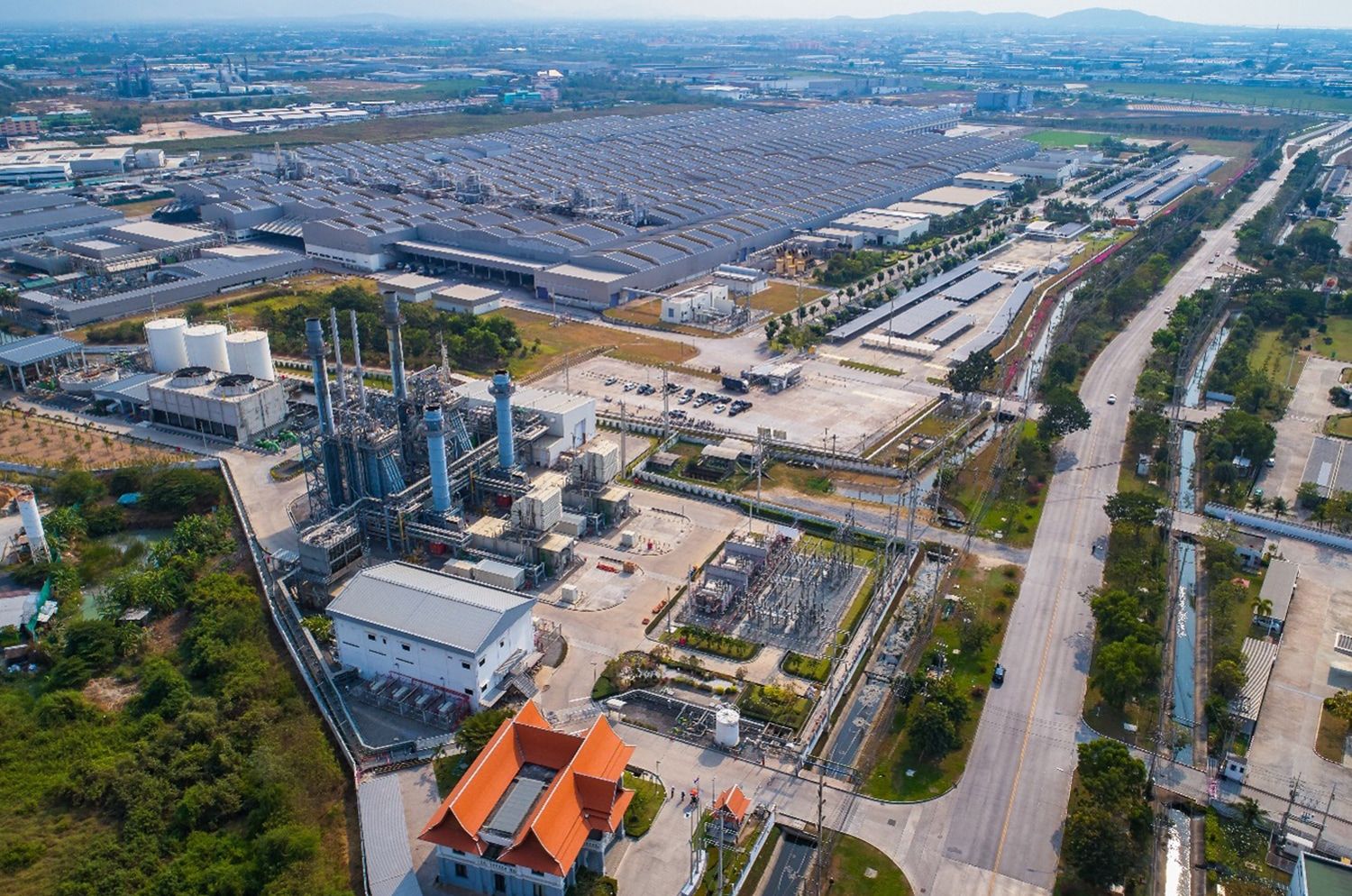
Photo: Aerial view of the Bridgestone Tire Manufacturing plant at AMATA City Chonburi Industrial Estate, with the power plant in the foreground.
The Bridgestone Group has 10 production plants in Southeast Asia, and Thailand alone has 3 new tire factories including BTMT. In 2013, a new technology center was established in Thailand with an investment of approximately 23.4 Million USD (3.7 billion yen). Regarding the position of Thailand within the group, Managing Director Namiyama said, "One of the reasons why major tire manufacturers around the world choose Thailand as their production base is because Thailand is one of the world's top producers of natural rubber." He continued, " Even in the global management system, which advocates global overall optimization, promoted by current Global CEO Shuichi Ishibashi, there is a policy to strengthen the eastern region, which is a strong manufacturing area."
Global CEO Ishibashi is trying to maximize the value created by the assets within the group by setting up a management system that divides the group's bases around the world into western and eastern regions. Mr. Namiyama said, "In the history of the company, we have found that the western bases have strengths in the field of solutions business, including IT, while the eastern bases have the greatest strength in the Japanese manufacturing culture that has been passed down for decades." He explained the current Global CEO's thinking, saying, "We are trying to raise the overall level of the group by transferring and integrating knowledge and experience while developing each of our strengths." The fact that the company has multiple production bases and technology centers in Southeast Asian countries, including Thailand, can be seen as proof that the company is seriously strengthening its manufacturing power based on TQC in the region, which is part of the eastern region.
The reason why BTMT is celebrating its 20th anniversary.
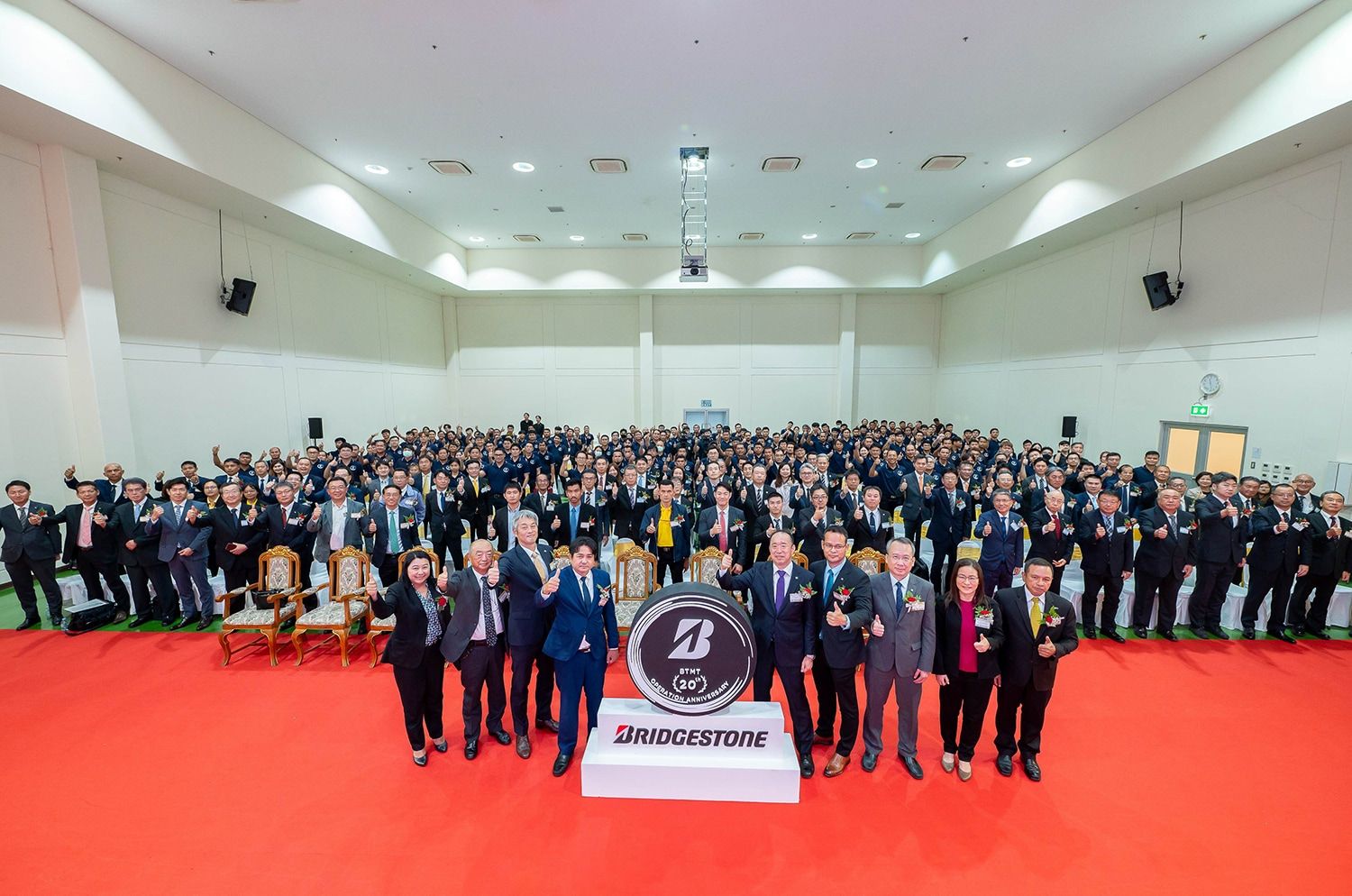
Bridgestone Tire Manufacturing (Thailand) celebrates its 20th corporate anniversary in 2024.
Since its first establishment in 2004, BTMT has been steadily playing its role as a base for the production and export of truck and bus radial tires (TBR), and currently has the capacity to produce just over 10,000 new TBRs per day. Managing Director Namiyama talked about the reason for the company's 20th anniversary this year with its current capacity, expressing thanks to the Thai government, Amata City Chonburi Industrial Estate, and many companies that support a wide range of the company's operations. He said "The process design and manufacturing management system and education transplanted from Japan to fulfill our role, a flow of goods that minimizes complexity, and the small group improvement activities that continue going on are major factors that have allowed us to reach our 20th anniversary. In a meantime, these factors have led to maximizing the production capacity, and the high level of engagement cultivated through improvement activities from all employees are BTMT's greatest strengths and characteristics.”
He added, "We will utilize our strengths and characteristics, and encourage continued creation of the social and customer value that we want to see through the Bridgestone E8 Commitment." In other words, as a TBR core production base, the company will support the reliable delivery of services and products to customers that are part of a sustainable premium business. Managing Director Namiyama expressed his enthusiasm for achieving sustainable management, saying,

To continue to realize our mission in the future, we must keep in mind returning to our origin, while also evolving and incorporating new ideas.
Reforms led by the "Japanese, the one and only"
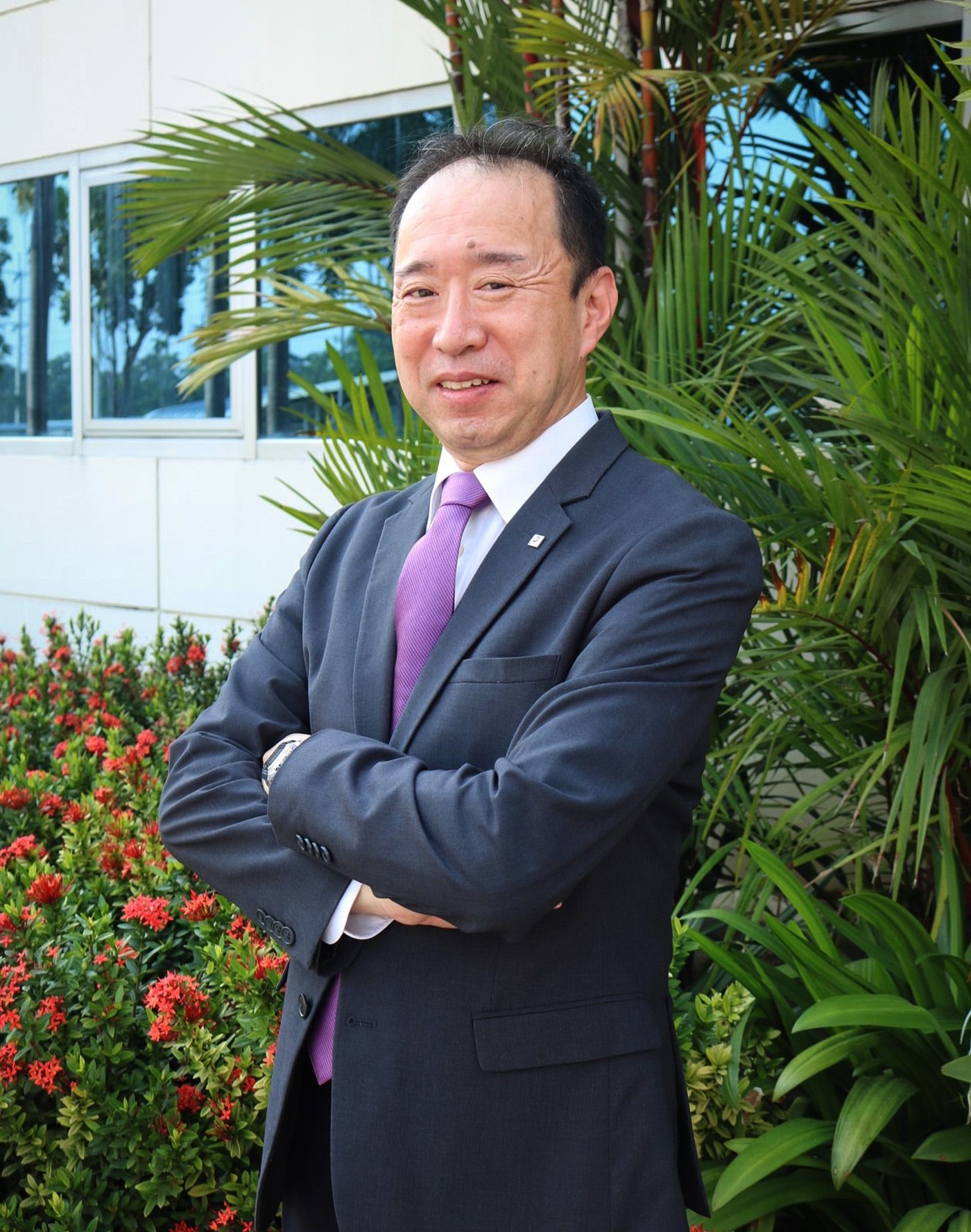
Managing Director Namiyama joined Bridgestone in 1994, starting from his first assignment at the Kurume Plant, where Bridgestone was founded, and then working in tire production technology and production management such as the Technical Center, Bridgestone Americas, Hofu Plant, and other locations before assuming his current position in January 2021. When he first took up this position, he recalled, "I was the only foreigner and Japanese among 2,200 employees, and inevitably the language spoken by general employees was Thai, so I couldn't understand the conversations between employees. Furthermore, the managing director's office was at the very back of the office, and I felt that the heavy wooden door was preventing smooth communication with employees."
He began to worry that problems and troubles in the factory might not be reported promptly and felt a sense of crisis about communication. First, he actively walked to the production site and called out to employees to make his presence known. At the same time, he moved the managing director's office closer to the office entrance, removed the cold wooden door and replaced it with a wide-opening glass door. The common language used among the management team shifted to English, which is the second language for both, creating an environment where they can communicate in their own words on a foundation of an equally difficult language.
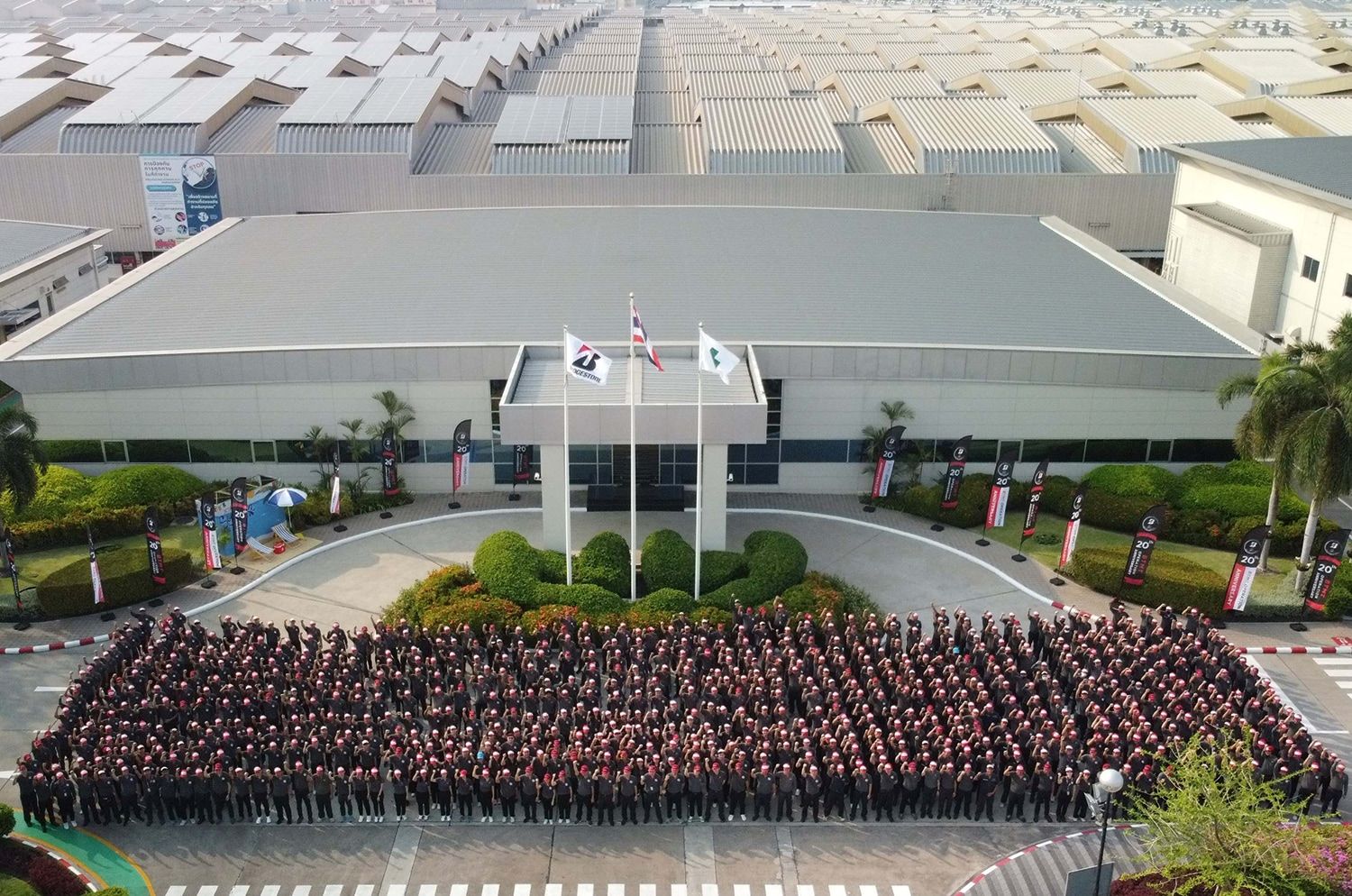
Photo: Mr. Namiyama and Bridgestone employees photographed in front of the plant.
Managing Director Namiyama explained, "First of all, it was urgent to activate communication within the management team in order to build trust. If transparency is strengthened both physically and culturally, we will be able to quickly and reliably understand accurate information as of now. If we do that, we will be able to move on to the next step, such as considering appropriate measures for matters that need improvement." Compared to when he first took up his position, he now says, "I can be proud that we have a team of excellent and reliable people," and shows his strong respect for his employees.
The Bridgestone Group is returning to its origin in preparation for the future. However, a simple return will not be enough to move forward. The interpretation of the company policy (current mission) left by the founder in line with the times, the global management system that improves the company's strengths through global overall optimization, and the strong Bridgestone's commitment to building a strong business structure that is not afraid of change while maintaining its roots - what all these have in common is perhaps it is about removing “the wooden door” that exist between "past and present," "east and west," and "old and new," and putting them closer together.








